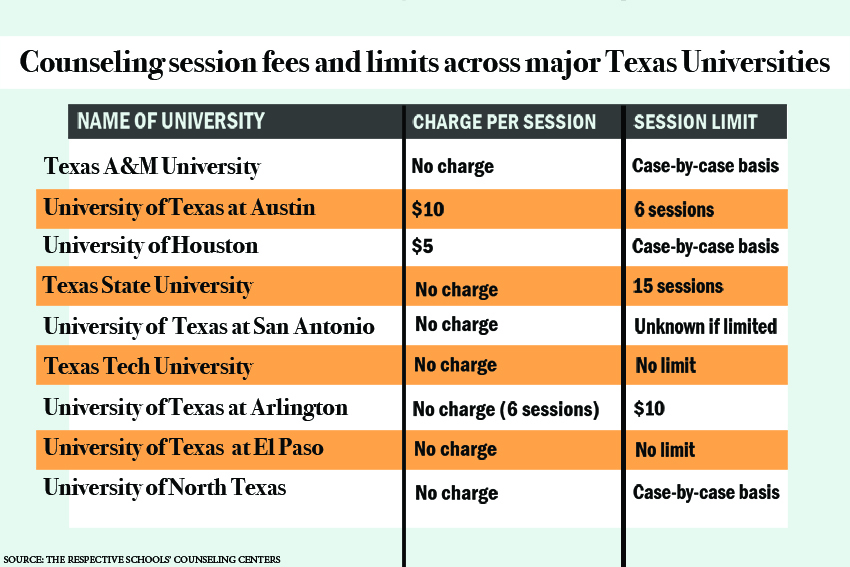UT-Austin is one of the only large public universities in Texas that charges for counseling and mental health services.
Of Texas’ 10 largest public universities, only UT and the University of Houston charge for counseling sessions. The University of Houston charges $5 for individual counseling compared to UT’s $10 per individual counseling session. Other major Texas universities, including Texas A&M University and Texas State University, provide free care included in tuition.
The Counseling and Mental Health Center, or CHMC, first started charging for counseling in 2010 when the University was going through heavy budget cuts, said center director Chris Brownson. In the past six years, the center has seen a 53 percent increase in student interest and an 81 percent increase in the number of counseling sessions provided, Brownson said.
Brownson said it is the variety and quality of mental health services offered to students through a large counseling staff that requires a fee for counseling sessions. He said UT has one of the highest clinician to student ratios in the state of Texas.
“We have a lot of counselors,” Brownson said. “We have a lot of different types of services, but as you can imagine, in order to be able to do that, there is a cost. So that is part of why there is a charge here.”
The center does not require payment immediately and will lift any counseling related financial bars at time of registration, Brownson said.
“One of the things that is very important to me as the director is that we are not erecting barriers to students seeking care for mental health services,” Brownson said. “We will work with students … for any kind of payment plan that works for them.”
Although time and mode of payment is negotiable, the $10 fee is not. For students like bilingual education junior Lourde Ventura-Rubio, the fee could be the deciding factor on whether they seek treatment or not.
Ventura-Rubio sought counseling at UT last fall, but discontinued it after one session because she said she felt she could not afford regular visits.
“I was helping with (my mother’s) bills, I was paying my own bills, and those $10 did make the difference,” Ventura-Rubio said. “(With) all of the money that we’re obviously paying with tuition, there should be some type of fund for students who are in need of counseling.”
The CMHC offers some free services like group counseling, classes, workshops and a 24/7 crisis line.
Marketing senior Yingxin Xu works as a peer educator for the center. She said although the center does not have enough counselors to provide individual service to all of UT’s 51,000 students, they can still reach out for support with the free services.
“It’s more about building the connection on campus,” Xu said. “I think it’s more about how we can help students to build the strategies to help themselves.”
Ventura-Rubio said she thinks mental health issues are often downplayed even though it can happen to anybody for any reason.
“This is something that the students want and are willing to vouch for,” Ventura-Rubio said. “And hopefully more people who are going through things, who are having difficulties, will step forward and get the help that they need.”




















